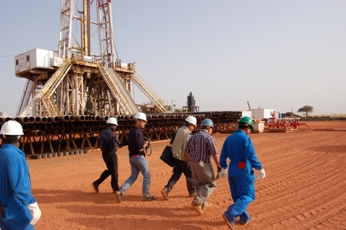Sudan’s state oil company hopes to secure concessions in Iraq
September 28, 2010 (WASHINGTON) – Sudanese state oil firm Sudapet and its partners are exploring the possibility of acquiring concessions in Iraq with a focus on small or medium-sized fields, one of its senior executives said today.

Because of its limited technical and financial resources, Sudapet often develops these joint ventures in oil projects and acts as a minority shareholder.
Farouk Abbas Shahin, Khartoum-based Sudapet’s senior vice president, said in an interview with Bloomberg in Cape Town today on the sidelines of an African energy conference that besides Iraq, the company also submitted bids for blocks in Syria and is looking for opportunities in Uganda and elsewhere in Africa.
In a separate interview with Reuters, Shahin said that Sudapet is working to improve recovery technology of the oil being extracted in Sudan.
“We are looking at new technology to improve the recovery factor so as to reach 30 percent, and that will maximize our reserves by an additional 1 billion barrels by 2020,” Shahin said.
Shahin said Sudan, which has mainly heavy, viscous oil, was recovering only about 23 percent of producible oil reserves. The country’s total oil production was about 480,000 barrels per day, with Sudapet providing about 10 percent of that.
“We have a partnership with CNPC, Petronas, and now we are looking for a partnership with Indonesia,” he said.
Shahin did not say the total investment required to boost oil extraction but said it could cost up to $300 million to increase production from a single field.
Besides the onshore oil initiatives, Shahin said Sudapet was also interested in shale and tight sands gas discovery in Block 8 in northern Sudan, with potential natural gas reserves running into several trillion cubic feet.
“We are going to take up the operatorship of this block from Petronas by June 2011, God willing, and we are going to acquire more shares from Petronas,” Shahin said.
Petronas currently holds a 77 percent stake in Block 8, and Sudapet wanted to increase its share to become a majority shareholder, said Shahin.
Besides block 8, Shahin said gas also was found in the shallow waters of the Red Sea, but the volumes at half a trillion cubic feet were not large enough to commercialise.
The central African country produced about 480,000 barrels of oil a day in 2008, exporting 394,000 barrels a day to Asian markets and consuming the rest, according to the U.S. Energy Information Administration’s website. Sudan hopes to bump production up to at least 600,000 bpd next year
The bulk of Sudan’s estimated 6 billion barrels of oil reserves are in the landlocked south, but most of the pipelines, the refineries and the port are in the north.
Under a 2005 peace accord that ended Africa’s longest civil war the south was granted the right to vote on independence from the north, a ballot scheduled for Jan. 9 2011.
Most analysts believe the south will secede next year and investors worry because much of the oil lies along the border dividing Sudan’s two halves, which is still disputed.
(ST)

Ahmed Chol
Sudan’s state oil company hopes to secure concessions in Iraq
Leave Southerners’ oil and go back to the middle east where you came from.